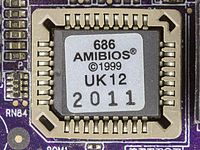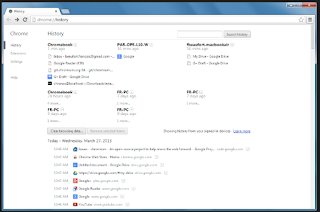What is a Virtual machine ( Introduction )
Hello friends,
Now that we have gone through Software/Hardware/Firmware now is the time to step ahead!
Lets learn about Virtual machines.
Before we get into details, lets get to understand what is a Virtual Machine.
Again, I am not giving you any text book answer, I will explain in very neutral and layman terms so that the basic is well understood and remembered.
The term Virtual means, something which is not physically available. Now, when I say virtual machine, it means a computer that is not physically available.
Lets consider a small Office network: 10 users and a server.
Total inventory required ( basics for PC office setup ) will be:
01. 11 monitors
02. 10 normal CPU's AND a Server CPU.
Now, I plan to install a virtual network, and what I need now is:
01. 11 Monitors.
02.JUST ONE SERVER PC. We are done!
The example above was only for a small scale startup with 10 pc setup, just imagine this setup for 100 and 1000 and more PC setups!
Virtual machines are not only economical but also are very fast compared to a normal PC.
It has less issues compared to a PC.
It is very secured from virus / malware compared to a normal PC.
It is easy to keep a track of employee usage
And many more benefits.
Whilst we discuss about Virtual machines, lets see what VMware has to offer:
VMware's desktop software is compatible with all major Operating systems that we know, including Linux, Microsoft Windows, and Mac OS X.
VMware provides three major types of desktop software:
VMware Workstation: This application is used to install and run multiple copies or instances of the same operating system or different operating systems on a single physical computer machine.
VMware Fusion: This product was specifically designed for Mac users and provides extra compatibility support with all other VMware products and applications.
VMware Player: This product was launched as freeware by VMware for users who do not have licensed VMWare products. This product is intended only for personel use.
VMware's software hypervisors intended for servers are bare-metal embedded hypervisors that can run directly on the server hardware without the need of an extra primary OS.
VMware’s line of server software includes:
VMware ESX Server: This is an enterprise-level solution, which is built to provide better functionality in comparison to the freeware VMware Server resulting from a lesser system overhead.
VMware ESX is integrated with VMware vCenter that provides additional solutions to improve the manageability and consistency of the server implementation.
VMware ESXi Server: This server is similar to the ESX Server except that the service console is replaced with BusyBox installation and it requires very low disk space to operate.
VMware Server: Freeware software that can be used over existing operating systems like Linux or Microsoft Windows.
Please visit my more blogs and subscribe : www.itsomairshariff.blogspot.com
Now that we have gone through Software/Hardware/Firmware now is the time to step ahead!
Lets learn about Virtual machines.
Before we get into details, lets get to understand what is a Virtual Machine.
Again, I am not giving you any text book answer, I will explain in very neutral and layman terms so that the basic is well understood and remembered.
The term Virtual means, something which is not physically available. Now, when I say virtual machine, it means a computer that is not physically available.
Lets consider a small Office network: 10 users and a server.
Total inventory required ( basics for PC office setup ) will be:
01. 11 monitors
02. 10 normal CPU's AND a Server CPU.
Now, I plan to install a virtual network, and what I need now is:
01. 11 Monitors.
02.JUST ONE SERVER PC. We are done!
The example above was only for a small scale startup with 10 pc setup, just imagine this setup for 100 and 1000 and more PC setups!
Virtual machines are not only economical but also are very fast compared to a normal PC.
It has less issues compared to a PC.
It is very secured from virus / malware compared to a normal PC.
It is easy to keep a track of employee usage
And many more benefits.
Whilst we discuss about Virtual machines, lets see what VMware has to offer:
VMware's desktop software is compatible with all major Operating systems that we know, including Linux, Microsoft Windows, and Mac OS X.
VMware provides three major types of desktop software:
VMware Workstation: This application is used to install and run multiple copies or instances of the same operating system or different operating systems on a single physical computer machine.
VMware Fusion: This product was specifically designed for Mac users and provides extra compatibility support with all other VMware products and applications.
VMware Player: This product was launched as freeware by VMware for users who do not have licensed VMWare products. This product is intended only for personel use.
VMware's software hypervisors intended for servers are bare-metal embedded hypervisors that can run directly on the server hardware without the need of an extra primary OS.
VMware’s line of server software includes:
VMware ESX Server: This is an enterprise-level solution, which is built to provide better functionality in comparison to the freeware VMware Server resulting from a lesser system overhead.
VMware ESX is integrated with VMware vCenter that provides additional solutions to improve the manageability and consistency of the server implementation.
VMware ESXi Server: This server is similar to the ESX Server except that the service console is replaced with BusyBox installation and it requires very low disk space to operate.
VMware Server: Freeware software that can be used over existing operating systems like Linux or Microsoft Windows.
Please visit my more blogs and subscribe : www.itsomairshariff.blogspot.com
Thank you for reading!
-Omair Sharif.
-Omair Sharif.
If you have any questions, please put in the comments box below and submit, I will response at the earliest. Thank you again.





Comments
Post a Comment